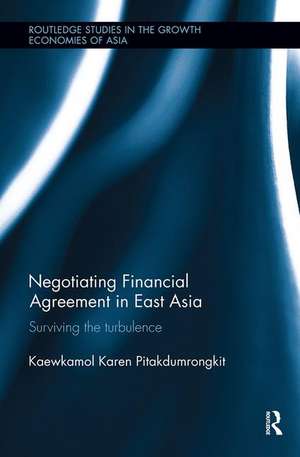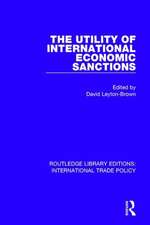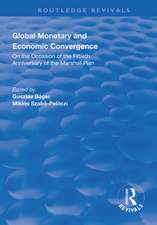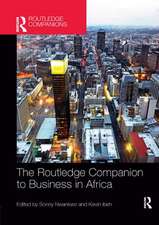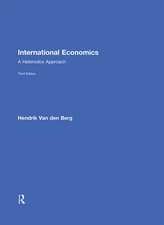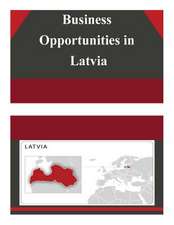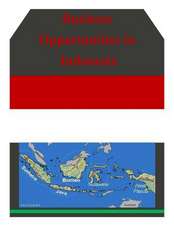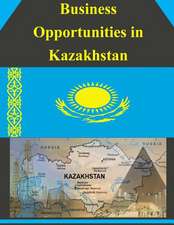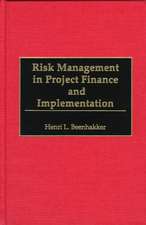Negotiating Financial Agreement in East Asia: Surviving the Turbulence: Routledge Studies in the Growth Economies of Asia
Autor Kaewkamol Karen Pitakdumrongkiten Limba Engleză Paperback – 12 feb 2018
This book examines East Asian financial negotiation processes and seeks to explain why some negotiations are successful despite the risk of bargaining failure. Using the Chiang Mai Initiative Multilateralization (CMIM) talks as the case study, the book analyses how states with little prior experience at dealing with certain aspects of an agreement manage to avert negotiation failure and successfully conclude their final deal. Using extensive archival research, in-depth interviews with involved negotiators and experts, and process-tracing method, it reconstructs the making of the CMIM agreement. The multi-country analysis reveals the roles played by key actors, namely China, Japan, South Korea, Indonesia, Malaysia, and Thailand, in shaping the agreement terms. The book goes on to argue that preventing a stalemate or succeeding in concluding arrangements like the CMIM is a product of various strategies and tactics employed by negotiators. These include employing bargaining strategies and tactics that help avoid a negotiation deadlock, and assessing the conditions under which such strategies and tactics are likely - or unlikely - to achieve the objective of avoiding bargaining failure.
As a study of East Asian economic negotiation processes, this book will be of huge interest to students and scholars of East Asian cooperation and regionalism as well as finance, international business, international relations and international political economy.
| Toate formatele și edițiile | Preț | Express |
|---|---|---|
| Paperback (1) | 309.69 lei 43-57 zile | |
| Taylor & Francis – 12 feb 2018 | 309.69 lei 43-57 zile | |
| Hardback (1) | 727.19 lei 43-57 zile | |
| Taylor & Francis – 16 noi 2015 | 727.19 lei 43-57 zile |
Din seria Routledge Studies in the Growth Economies of Asia
-
 Preț: 309.65 lei
Preț: 309.65 lei - 9%
 Preț: 934.94 lei
Preț: 934.94 lei -
 Preț: 326.49 lei
Preț: 326.49 lei - 8%
 Preț: 389.31 lei
Preț: 389.31 lei -
 Preț: 319.01 lei
Preț: 319.01 lei - 8%
 Preț: 382.25 lei
Preț: 382.25 lei -
 Preț: 422.04 lei
Preț: 422.04 lei - 26%
 Preț: 1045.20 lei
Preț: 1045.20 lei - 18%
 Preț: 1287.06 lei
Preț: 1287.06 lei - 18%
 Preț: 1052.38 lei
Preț: 1052.38 lei - 18%
 Preț: 784.00 lei
Preț: 784.00 lei - 18%
 Preț: 999.34 lei
Preț: 999.34 lei - 25%
 Preț: 823.63 lei
Preț: 823.63 lei - 18%
 Preț: 1120.07 lei
Preț: 1120.07 lei - 26%
 Preț: 877.59 lei
Preț: 877.59 lei - 18%
 Preț: 1118.46 lei
Preț: 1118.46 lei -
 Preț: 447.51 lei
Preț: 447.51 lei - 18%
 Preț: 1057.89 lei
Preț: 1057.89 lei - 25%
 Preț: 768.82 lei
Preț: 768.82 lei -
 Preț: 375.54 lei
Preț: 375.54 lei - 25%
 Preț: 746.22 lei
Preț: 746.22 lei - 18%
 Preț: 1053.92 lei
Preț: 1053.92 lei - 28%
 Preț: 820.80 lei
Preț: 820.80 lei - 18%
 Preț: 1059.84 lei
Preț: 1059.84 lei - 18%
 Preț: 1337.26 lei
Preț: 1337.26 lei - 25%
 Preț: 852.63 lei
Preț: 852.63 lei - 30%
 Preț: 851.82 lei
Preț: 851.82 lei - 18%
 Preț: 1002.63 lei
Preț: 1002.63 lei - 16%
 Preț: 248.97 lei
Preț: 248.97 lei - 26%
 Preț: 1045.83 lei
Preț: 1045.83 lei - 26%
 Preț: 988.47 lei
Preț: 988.47 lei - 26%
 Preț: 821.29 lei
Preț: 821.29 lei - 18%
 Preț: 1218.08 lei
Preț: 1218.08 lei - 18%
 Preț: 1113.16 lei
Preț: 1113.16 lei - 18%
 Preț: 1048.43 lei
Preț: 1048.43 lei - 26%
 Preț: 849.29 lei
Preț: 849.29 lei - 26%
 Preț: 821.46 lei
Preț: 821.46 lei - 18%
 Preț: 1004.72 lei
Preț: 1004.72 lei - 25%
 Preț: 823.63 lei
Preț: 823.63 lei - 18%
 Preț: 1334.90 lei
Preț: 1334.90 lei - 25%
 Preț: 823.08 lei
Preț: 823.08 lei - 18%
 Preț: 1056.00 lei
Preț: 1056.00 lei - 15%
 Preț: 280.13 lei
Preț: 280.13 lei - 18%
 Preț: 1057.75 lei
Preț: 1057.75 lei - 26%
 Preț: 765.77 lei
Preț: 765.77 lei - 16%
 Preț: 251.08 lei
Preț: 251.08 lei - 26%
 Preț: 990.57 lei
Preț: 990.57 lei -
 Preț: 382.25 lei
Preț: 382.25 lei - 28%
 Preț: 819.67 lei
Preț: 819.67 lei
Preț: 309.69 lei
Nou
Puncte Express: 465
Preț estimativ în valută:
59.26€ • 62.03$ • 49.32£
59.26€ • 62.03$ • 49.32£
Carte tipărită la comandă
Livrare economică 31 martie-14 aprilie
Preluare comenzi: 021 569.72.76
Specificații
ISBN-13: 9781138494657
ISBN-10: 1138494658
Pagini: 208
Ilustrații: 20
Dimensiuni: 156 x 234 x 11 mm
Greutate: 0.45 kg
Ediția:1
Editura: Taylor & Francis
Colecția Routledge
Seria Routledge Studies in the Growth Economies of Asia
Locul publicării:Oxford, United Kingdom
ISBN-10: 1138494658
Pagini: 208
Ilustrații: 20
Dimensiuni: 156 x 234 x 11 mm
Greutate: 0.45 kg
Ediția:1
Editura: Taylor & Francis
Colecția Routledge
Seria Routledge Studies in the Growth Economies of Asia
Locul publicării:Oxford, United Kingdom
Public țintă
Postgraduate and UndergraduateCuprins
1. Introduction 2. How Countries Evade Negotiation Stalemate 3. China 4. Japan 5. South Korea 6. Indonesia, Malaysia, and Thailand 7. Conclusions
Notă biografică
Kaewkamol Karen Pitakdumrongkit is Assistant Professor in the S. Rajaratnam School of International Studies, Nanyang Technological University, Singapore.
Descriere
This book examines East Asian financial negotiation processes and seeks to explain why some negotiations are successful despite the risk of bargaining failure. Using the Chiang Mai Initiative Multilateralization talks as the case study, it analyses how states with little prior experience manage to avert negotiation failure.
